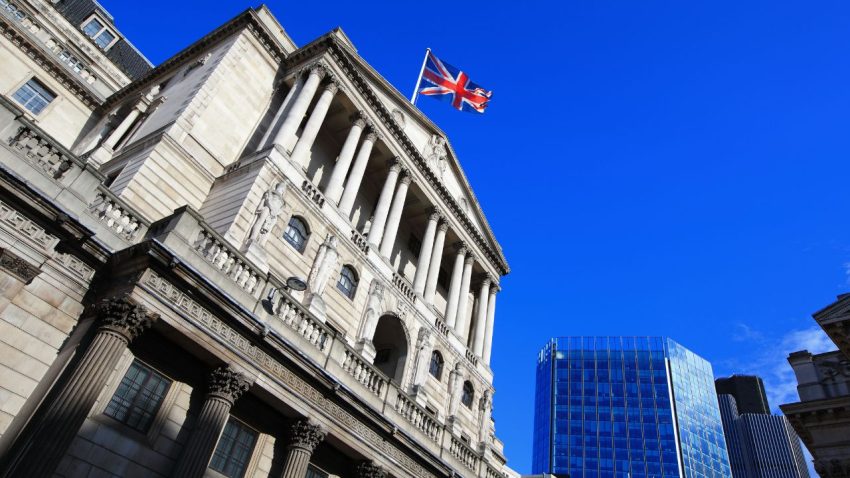We’ll keep you in the know to help you find the best mortgage deal
The mortgage market is sensitive and fast-paced and the rates are constantly changing.
You can’t predict what’ll happen next with mortgages, but understanding what’s going on with rates at the moment can be helpful if you’re getting a mortgage now or in the near future.

Some articles on the site contain affiliate links, which provide a small commission to help fund our work. However, they won’t affect the price you pay or our editorial independence. Read more here.
How are mortgage rates set?
There are lots of different factors that impact mortgage rates. Economically, the Bank of England’s base rate and swap rates (interest rates that banks or other financial institutions use to borrow money from each other) are big influences on the rates lenders may offer.
And then if we look a little bit closer to home, things like buyer demand and competition between lenders, also play their part in mortgage prices. If one high street provider cuts their rates, several more usually follow.
There are also internal factors that lenders will consider when setting mortgage rates, for example Loan to Value (LTV).
In a nutshell, LTV is how the percentage you have borrowed compared to the value of your house. So if your house is worth £300,000 and your deposit was £30,000, you’d have a £270,000 mortgage and a LTV of 90%. Typically, the lower your LTV, the lower the interest rate on your mortgage.
But that’s not all. Andy Shead, senior mortgage advisor at Tembo, says when it comes to specialist or non-standard mortgages, such as those for self-employed borrowers, those with low deposits, or guarantor mortgages (where a trusted person promises to repay the mortgage if the borrower can’t), lenders may set different rates to reflect the level of risk they see that mortgage type as having.
Affordability can also affect the rate you pay on your mortgage. As well as your deposit, providers will look at your employment type, outgoings and credit history to decide what products you’ll be eligible for, and what rate you could be offered.

Try our mortgage calculator
Our mortgage calculator helps simplify things by giving you an idea of how much you could borrow and your likely monthly repayments.
What’s happening to mortgage rates now?
In recent weeks, there’s been a mix of mortgage rate hikes and cuts by lenders. For instance, HSBC has introduced the cheapest five-year fixed rate at 3.9%, while other lenders like NatWest and Halifax have increased their rates slightly.
Andy explains that this reflects the current uncertainty surrounding future base rate movements, especially as inflation remains above the Bank of England’s 2% target.
Despite the Bank of England recently cutting its base rate from 4.25% to 4% to support the sluggish economy, stubborn inflation, which rose to 3.8% in July, has cast doubt on whether there will be another cut this year.
In general, mortgage rates have eased since the September 2022 mini-budget, with the average two-year fixed rate now at 4.98% and the average five-year fixed rate at 5.01%, according to data firm Moneyfacts. This is significantly lower than summer last year – in June 2024, the average two-year fix rate was 5.93% while a five-year was at 5.5%.
Get the best of our money saving content every week, straight to your inbox
Plus, new Quidco customers get a high paying £18 welcome offer

What will happen to mortgage rates in the next few months?
Andy says: “For now, we’re unlikely to see big swings in the market. Instead, average mortgage rates are expected to remain in the 4-5% range as hopes for another base rate cut this year have been dampened. Even if another cut is announced by the end of the year, keep in mind that base rate cuts are normally priced into fixed rate mortgage deals before a cut is announced.”
The rate you’ll be offered is influenced by more than just the base rate, Andy says. Borrowers with larger deposits or equity may be offered rates much lower than the current averages. For example, the lowest two-year fixed rate deal currently available is 3.85%, according to Tembo.
Plus, changes to affordability testing by some lenders could make it easier for some buyers to qualify for mortgages, even with the current rate levels, with some now able to borrow 20% more than they could a few months ago.
But as with any predictions, things change. And with the uncertainty of the past few months, it goes to show how tricky it is to make accurate mortgage rate predictions – it’s almost impossible!
So what should you do? Andy says if you’re holding off on a house purchase or remortgage, don’t delay in the hope that you’ll be able to second-guess the market. And if you need help – ask.
Speak to a mortgage broker and get expert advice on your options now. Then you can lock in a deal and keep it under review in case a better deal comes up before you need to complete it.

Compare mortgage rates and deals
Looking for a mortgage? Find the top rates from over 200,000 deals and 100+ lenders with our live tables.
Is now a good time to fix?
This depends on your circumstances and how you prefer to manage your money.
Andy says: “The market is currently predicting that interest rates won’t fall as quickly as previously hoped, if they fall at all, with little movement expected. So if you’re worried that your monthly mortgage payments could rise in the future, fixing now could help avoid facing higher interest rates down the line.”
Fixed mortgages are preferable to many because they make it easier to budget because you know how much you’re paying every month. Lots of people find this reassuring, especially those on a fixed income or where money is tight. But the downside is, you could find that you end up locked into paying a rate that is higher than those offered elsewhere if interest rates drop.
But how long should you fix for? Well, Andy says: “One thing to consider is that for fixed rate mortgage deals that are five years or longer is that some lenders may let you borrow more compared to other types, such as variable rates. This is because lenders are required to stress test affordability to make sure the mortgage repayments are still affordable if rates increase within the first five years. By choosing a longer fixed rate mortgage deal of five years or longer, they don’t have to stress test.”
However, before you rush and fix for five or more years on this basis, be mindful that this option won’t be right for everyone. There are pros and cons to different types of mortgage and it’s worth speaking to a mortgage broker before you take the leap and fix your mortgage now in case it could be better to hold on for a little while longer.
 Featured switching deal
Featured switching deal
 Customer rating
3.8/5
Customer rating
3.8/5
- Switch bonus£200
- Offer endsUnknown
- Extra bonus£25 Amazon Gift Card
- FSCS Protected? Yes
- Switch bonus requirements Switch using the Current Account Switch Service and close your old account within 60 days of starting the switch
- Deposit requirements Deposit £1,500 in the first 60 days from opening the account
- Direct debits transferred over Set up two Direct Debits before or after the switch from a selected list of household bills
- Existing customers? Can't have held any Santander current account on 1 January 2025
- Restrictions Can't have received a switching bonus from Santander already, offer limited to once per person
- Eligible accounts Open a new or hold an existing Everyday, Edge, Edge Up or Edge Explorer current account
- £25 Amazon Gift Card requirements To qualify for the gift card, you need to complete a full switch using CASS, and make five debit card transactions within 30 days of opening the account
Should I consider a variable rate mortgage?
Again, this will depend on a number of things including where you’re at with your finances, how risk tolerant you are and what’s going on with interest rates.
Variable rate mortgages tend to track the Bank of England base rate, so if it goes up, your repayments will too. And likewise, if it goes down, you’ll pay less each month. So you’ll need to decide whether it’s a risk you’re willing to take.
Andy says if you can absorb higher payments down the line, the potential savings with a variable rate mortgage might be worth the risk. But you have to be able to cover your mortgage payments if rates go up by 1 – 3 percentage points – or maybe even higher!
For example, if you had a £200,000 mortgage over 25 years at a rate of 5% your monthly repayments would increase by £120 a month to £1,289 if the rate went up to 6%. That’s an extra £1,440 a year.
Andy adds: “Ultimately, it’s up to you and how comfortable you feel with taking the risk that interest rates may drop or increase, as well as what’s right for your situation. As ever, getting expert advice from a mortgage advisor is always a good idea, as they can help talk through the different options available to you and give their expert opinion based on current market conditions and what rates you could be offered.”






Hi could you please do an item on morgage insurance especially redundancy insurance